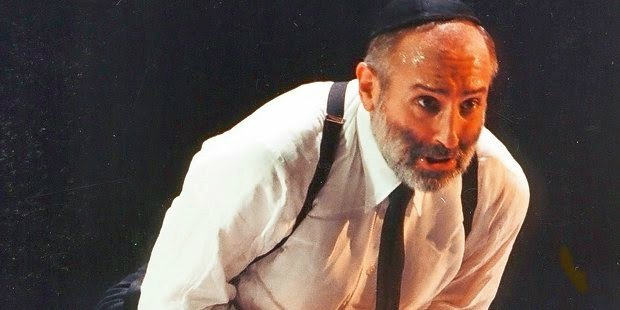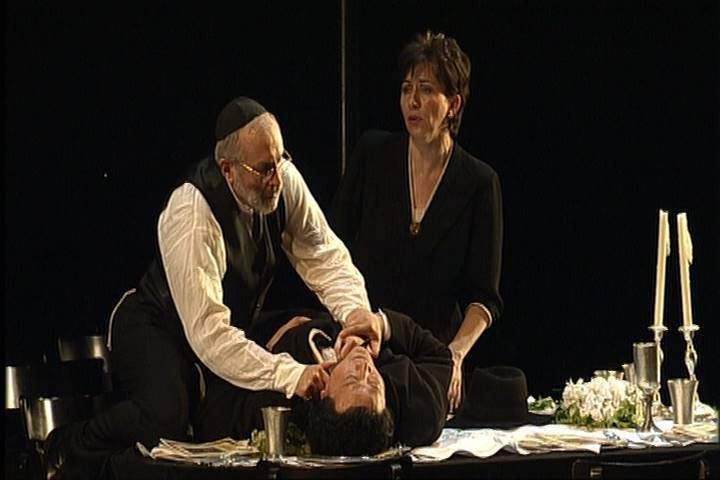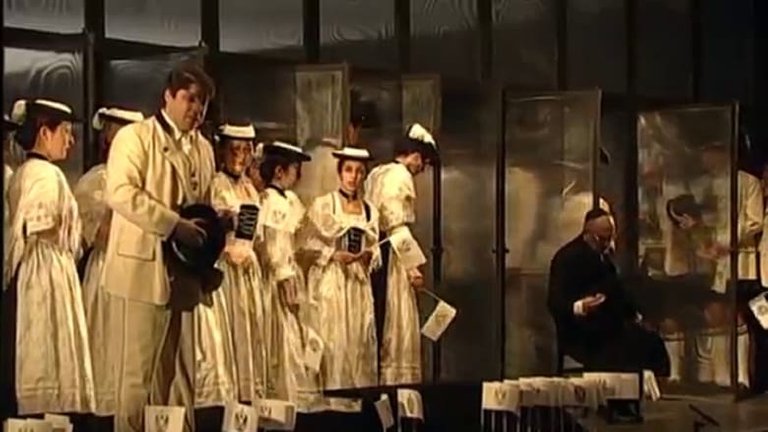Based on libretto by Eugene Scribe, Jacques Fromenthal-Halevy's La Juive (composed in 1835) is a heavy opera that deals with a timelessly heavy issue - what happens when people puts their religion before everything else, the well-being of their family included.

Cornélie Falcon as Rachel on 23 February 1835 at the Paris Opera. source
Set in Konstanz, Germany during the Counsel of Constance in 1414 under the religiously segregated rule of the Holy Roman Empire (sexual relation between Jews and Christians was prohibited under the penalty of death (usually by burning at stake)). Rachel, the adopted daughter of the vengeful Jewish goldsmith Eléazar, is caught having a romantic relation with ‘Samuel' a painter who is actually the married (and distressingly Christian) Prince Léopold, the general who had recently earned glory in the war against the Hussites, in disguise. The crowd demand their death even though Cardinal Brogni, the man who had caused Eléazar to be exiled from Rome many years ago, had grown more keen on mercy since. The fate of father and daughter all comes down to whether pride and the hatred between religious factions is stronger than the humanly sense of selfless love and mercy. This is a period opera with a moral that unfortunately transcends its time, I'm afraid.
On the music front, this is a French style grand opera (5 long acts) containing a series of set arias and choral numbers.
CAST:
Eléazar the Jewish jewess ::: Neil Shicoff (tenor)
Rachel, his adopted daughter ::: Krassimira Stoyanova (soprano)
Cardinal Brogni ::: Walter Fink (bass)
Léopold, a Christian prince ::: Jianyi Zhang (tenor)
Princess Eudoxie, his wife ::: Simina Ivan (soprano)
Ruggiero ::: Boaz Daniel (baritone)
Albert ::: Janusz Monarcha (bass)
Vyekoslav Sutej / Orchestra and Chorus of the Vienna State Opera
Stage directed by: Günter Krämer
Recorded live at the Vienna State Opera on 15 May 2003, this staging by Günter Krämer is a conceptual non-traditional one that will not be to everyone's liking. I don't think he actually places the story in any specific time-frame or city, though some of the symbolism he opportunistically utilizes are recognizably from a certain well known era (the painted star of David on Eléazar's door, for example, is really there to indicate what the root of the mutual mistrust and hatred between him and the town folks is (religious differences) rather than to put the setting in pre-WW II Germany... And so it is best to not get too hung up on period-accuracy when it comes to costumes and staging antics and just look at them in term of ‘symbolism' instead. I'm not sure that I understand correctly all the message the director tries to send with his caricature portrayal of the town folks or the black & white contrast in the costumes and other stuff, but they aren't really too distracting.
It helps, of course, to have a strong acting cast to help carry the main story of the opera like we have here. Neil Shicoff practically disappears into his portrayal of the vengeful never-forget-and-never-forgive Eléazar and earns every decibel of the tumultuous applause he receives at the curtain at the end of the performance. I really don't like his voice much... it is a strangely hollowed one but it stands up well against the orchestra and chorus. And it is both intelligently used with a great sense of drama... I've always believed that the loudness of a note doesn't necessarily have anything to do with its ability to convey intense emotion, and Mr. Shicoff proves my point in his singing of Eléazar. His intensity emanates out of every note regardless of how softly he sings (or even hisses) it.
As the leading lady of the show, Rachel, is the Bulgarian soprano Krassimira Stoyanova; an amazing singing actress with a sweet and yet splendidly powerful voice of many colors (it is really a marvelous sound... a Slavic voice that is bright enough to convey innocence). It is easy to ignore whatever else is happening on the stage when she is singing on it. A natural actress, she easily convinces of Rachel's point of view even when the scenery and choral choreography work against it. You can close your eyes and just listen and still know what she is expressing even if you don't understand the sung French lyric. I don't know what it is with the Bulgarian... perhaps they were all born with a bit of Orpheus in their blood and vocal chords?
Her suitor, Léopold, is mostly beautifully sung by the bright-voiced tenor, Jianyi Zhang (Léopold's music might be a tad heavy for him). I'm afraid he is occasionally hard to pick out from the crowd, but on close up shots he does act well with his face (I don't know how well that got over in the live auditorium, though). Basso Walter Fink is a sympathetic Cardinal Brogni. He is solid if not very subtle vocally, and he acts well with both Shicoff and Stoyanova - making it easy to keep focus on the human story of the opera.
The supporting roles are a bit mixed. Simina Ivan is heavily tested by Princess Eudoxie's music (though she is a convincing actress), but Boaz Daniel is really better than his small part of Ruggiero.
The musical performance is well kept together by Maestro Vyekoslav Sutej, who went out of his way to support the singers (thankfully!) and kept a tight control of his huge orchestra. The way he coaxes the whole range of dynamics from piano to forte from such a large ensemble of players without detracting attention from the singers is worth a loud round of bravi at the curtain!
There is a documentary film included about Neil Shicoff and how Halevy's opera got revived that fans of the tenor would delight in (though non-fan might find it rather over the top), including a ceremony where the tenor is awarded the honorary membership to the Vienna State Opera (what an irony this would turn out to be 3 years later when he got snubbed by the same company from the post of its general directorship!).
All in all, it is a good performance of the rarely staged opera that should be on every opera fan's music shelves if only for the stellar showing of Shicoff and Stoyanova.


